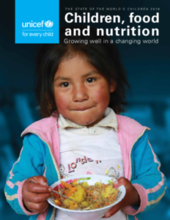This edition of The State of the World’s Children report examines children, food and nutrition. It seeks to deepen understanding around the causes and consequences of children’s malnutrition in all its forms and to highlight how governments, business, families and other stakeholders can best respond.
Chapter 1 examines the changing face of children’s malnutrition. It sets out the current state of undernutrition, hidden hunger and overweight worldwide, explores the lives of children affected by severe acute malnutrition, and investigates the cost to children and to us all of malnutrition. It also introduces in greater detail some of the main ideas around food systems.
Chapter 2 investigates malnutrition across the life of the child, from development in the womb to the point where a young person is entering adulthood. It explores the developmental impacts of malnutrition and the unique nutritional needs and influences at each stage of childhood.
Chapter 3 explores malnutrition in a changing world. Globalization and urbanization are changing children’s diets while disasters and conflict worsen nutritional prospects for millions of poor and excluded children. Without transformation of today’s food systems, healthy diets will remain out of reach for the most vulnerable children, perpetuating intergenerational cycles of disadvantage.
Chapter 4 examines the current state of responses to children’s malnutrition, including the increased attention – at the global and national level – to the importance of addressing malnutrition across multiple systems, with particular emphasis on the food system in synergy with the health, water and sanitation, education and social protection systems, and on how different stakeholders are responding.
Finally, Chapter 5 sets out an agenda to put children’s nutrition rights first. This agenda is driven by two imperatives. First, children have unique nutritional needs and can suffer unique harm from malnutrition. Putting children’s needs first is key to ensuring that every child and young person has the nutrition they need to get the best start in life. Second, all children and young people will need nutritious, safe, affordable and sustainable diets if societies are to meet the economic, social and environmental challenges of our changing world in the 21st century.

